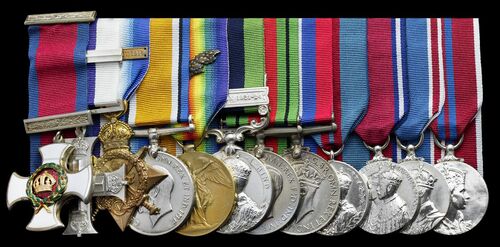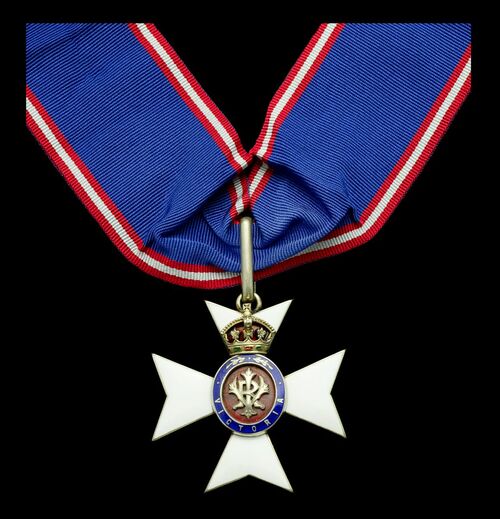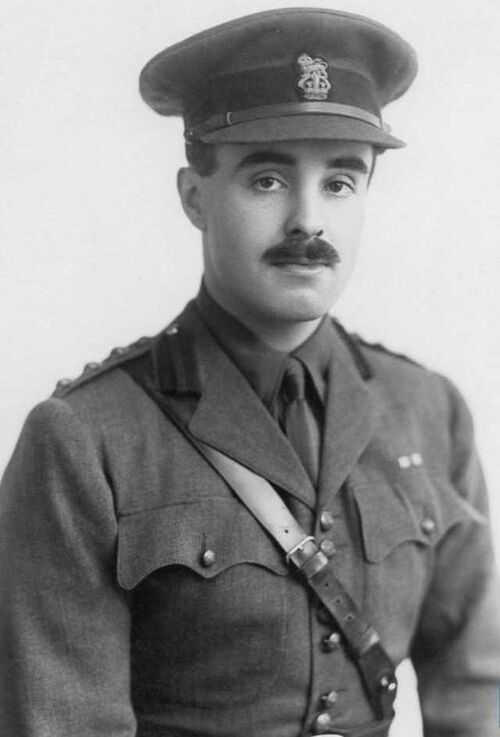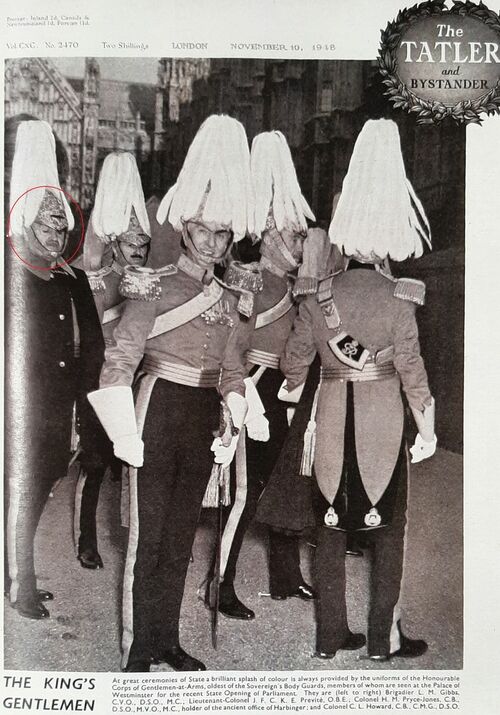Auction: 24002 - Orders, Decorations and Medals
Lot: 193
The superb and unique '1937 Coronation Honours' C.V.O, 'Western Front' D.S.O, M.C. and Second Award Bar group of thirteen awarded to Brigadier L. M. Gibbs, Coldstream Guards, an Old Etonian and Pre-War Guardsman who was wounded near Vermelles on 3 October 1915, and four times Mentioned in Despatches during the Great War
On Staff of the British Delegation to the Supreme War Council at Versailles, served in India as A.D.C. to the Commander-in-Chief earning a unique clasp to the Regiment, Commanded British troops in Paris for the Funeral of Marshal Foch, served as a Brigadier during the Second World War, ending his days as a member of the Gentleman at Arms
The Royal Victorian Order, C.V.O., Commander’s neck Badge, silver-gilt and enamel, the reverse officially numbered ‘C974’, with short section of neck riband; Distinguished Service Order, G.V.R., silver-gilt and enamel, with integral top riband bar; Military Cross, G.V.R., with Second Award Bar, unnamed as issued; 1914 Star, copy clasp (Lieut: L. M. Gibbs. C. Gds.); British War and Victory Medals, with M.I.D. oakleaves (Lt. Col. L. M. Gibbs.); India General Service 1908-35, 1 clasp, Waziristan 1921-24 (Maj. L. M. Gibbs. C. Gds.); Defence and War Medals 1939-45; Coronation 1911 (2-Lieut. L. M. Gibbs. C. Gds.), contemporarily engraved; Jubilee 1935 (Colonel L. M. Gibbs. D.S.O. M.C.), contemporarily engraved; Coronation 1937 (Colonel L. M. Gibbs. C.V.O., D.S.O., M.C.), contemporarily engraved; Coronation 1953, unnamed as issued, mounted court-style as worn, good very fine (13)
Note only two members of the Coldstream Guards were awarded the India General Service 1908-35, with Gibbs' being the only to an officer, the Waziristan 1921-24 bar is unique to the Regiment.
C.V.O. London Gazette 11 May 1937.
D.S.O. London Gazette 3 June 1919.
M.C. London Gazette 1 January 1917.
Second Award Bar to M.C. London Gazette 11 January 1919:
‘Near Morlancourt, France, 24 August 1918. For conspicuous gallantry and devotion to duty. When the position on the left flank was very obscure owing to the next Division failing to reach its objective, he made a daring reconnaissance to gain information and get in touch. He collected troops and organised the situation, and brought most valuable information to the brigade. He was under intense fire from machine-guns and minenwerfer at close range.’
Lancelot 'Lags' Merivale Gibbs was born at Wraxall, Somerset on 23 December 1889, the son of Anthony and Janet Gibbs of Tyntesfield, Wraxall. He was educated at Eton College from 1902-08 and commissioned 2nd Lieutenant with the 3rd (Militia) Battalion, Somerset Light Infantry on 14 November 1914. Successfully passing the Competitive Examination from the Reserves he was accepted into the Coldstream Guards on 7 December 1910.
Great War
Advanced Lieutenant on 19 July 1913 Lags was serving as transport officer for the 2nd Battalion, Coldstream Guards on the outbreak of the Great War. Entering the war in France on 12 August 1914 he spent the weeks of the Great Retreat and Advance to the Aisne constantly foraging, sometimes by rather underhand methods as his diary makes clear in an entry for 18 September 1914 which states:
'Had a long argument with a man for oats and eventually got them cheap by saying I would take the army away from SOUPIR and leave it to the Germans!! Foraged as usual and got rather too much. […] Headquarter party had dinner first and others came in about 7:45 very wet and tired. Had some Champagne for them very cheap 4 […] francs a bottle! Got off to bed early, hoped for the second line which never turned up.'
Present for the Battle of the Aisne and the Race to the Sea Gibbs did not enjoy the winter of 1914 comments in his diary chime with a quote in Forgotten Warrior, a biography of fellow Old Etonian, Merton Beckwith-Smith, which states:
'Faced with this ghastly toll, Merton's correspondents in France were full of foreboding. On 3 November, Lancelot Merivale Gibbs (Or "Lags"), the transport officer of the 2nd Coldstream Guards, described conditions as "awful".'
Continuing to serve with distinction Gibbs was 'mentioned' (London Gazette 17 February 1915 refers) and appointed Adjutant on 16 March 1915 and was advanced Captain on 17 July that same year. It was in that role that he joined the British line at the Battle of Loos with the Battalion entering the trenches on 26 September and remaining their until 30 September. Pulled back from the line they were ordered to new trenches at Vermelles and were marching there when Gibbs had a close-run thing, his diary states:
'Started off for new trenches east of Vermelles about 6:00 p.m. Had a most unpleasant walk up to them. I got hit by a shell but so slightly that it really only bruised. Relieved the 1st K.R.R. in some very nasty trenches, which had been partially blown in during day by a German attack. Finished relief about 11:00 p.m. Had my shoulder "Dressed"!'
'Mentioned' again (London Gazette 1 January 1916 refers) he was to see heavy fighting through the later stages of the Battle of the Somme the Guards Brigades suffered severe losses. Gibbs was present for much of the fighting and his diary lists the names of several officers he had been serving with since 1914, for his services around this time he was awarded the Military Cross. Appointed Commanding Officer of the 2nd Grenadier Guards on 25 November 1916, with a promotion to Lieutenant-Colonel while undertaking the role he held it until the next year.
Relinquishing the role he served with several Battalions as Major before being posted to the Staff as General Staff Officer Class 3 on 26 February 1918 with a further appointment to Brigade Major of the Guards Division on 4 May 1918. It was in this role during the Second Battle of the Somme that he earned the Second Award Bar to his M.C. with the Diary entry for 24 August stating:
'The hour for the attack was 1:00 a.m. and was started with a heavy barrage. The "Green Line" was taken and some 300 prisoners were taken in Happy Valley. The Bosche who had been expecting these attacks put down a very heavy barrage at once on the Albert-Bray road and also on the "Green Line". A small pocket of Machine Guns and Trench Mortars remained on the 21 Battalion's left and stopped the 12th Division on our left coming up. These started to hammer the 21 Battalion causing considerable casualties and the situation looked serious, their left being quite in the air. The 15 Battalion therefore went up and formed a defensive flank. I went up and discovered the situation much better than expected. Going right up to the left I found the Trench Mortar gone but the Machine Guns still active. Otherwise the Brigade front was intact and in touch on the right. The front was reorganised after dark, the 15 Battalion coming up on the right and taking partly over from the right Brigade and a bit from 17 Battalion. The 17 Battalion in the centre with the 21 Battalion, now weak, on the left.'
It is typical of Gibbs' attitude to his own achievements that his own role in the battle is very much understated. The end of the war brought another appointment to the Staff and another 'mention' (London Gazette 20 December 1918). Gibbs was further decorated with a D.S.O. for his achievements throughout the war which he received while working with the staff on the British War Council at Versailles between February-June 1919 along with his fourth and final 'mention' (London Gazette 5 July 1919 refers).
Interwar and Second World War
Serving now with the permanent rank of Major he was posted to India in December 1922 on the Staff of the Commander in Chief, Lord Rawlinson. It was in that role that he saw Operations in Waziristan between 1922-24, the only member of the Coldstream Guards to do so and indeed one of only two Guardsmen to have earned a medal in India at that time. Gibbs left India in March 1925 he was appointed to Command the 2nd Battalion, Coldstream Guards in 1927 on their posting to the Shanghai Defence Force.
Stationed in Paris during the funeral of Field Marshall Ferdinand Foch he was the commander of the British troops at the event. Advanced Lieutenant-Colonel on 15 December 1930 Gibbs was appointed to Command the 1st Battalion, Coldstream Guards. In this role he led the Battalion to a posting in Egypt in the Spring 1902. A transfer to the War Office as Assistant Adjutant General saw him further promoted Brevet Colonel on 10 August 1934 and he achieved the full rank on 15 December the same year. While serving in this role he was present for the Coronation of King George VI and was awarded the C.V.O. in the honours list.
Gibbs retired on 10 August 1938 and joined His Majesties Honourable Corps of Gentlemen in January 1939. He was soon returned to duty however on the outbreak of the Second World War as Commander of Administration for the London Area. This appointment came with a promotion to Brigadier from 3 December 1940 at a time when they were operating out of Leconfield House, overseas anti-invasion measures.
Joining the retired list on 31 July 1945 he reverted to retired pay in 1946 and finally left the reserve of officers in 1948. Gibbs was appointed a Lieutenant of the Gentlemen at Arms in 1952 and in this role was a part of the Coronation of Queen Elizabeth II. He died at his home in Sloane Court East, Chelsea on 8 December 1966; sold together with a comprehensive archive comprising:
i)
The recipient's complete and extremely detailed hand-written diary from the Great War, August 1914 - June 1919, 169 pages with a full typed transcript, in both hard copy and electronic forms.
ii)
Four Mentioned in Despatches Certificates, dated 14 January 1915, 30 November 1915, 8 November 1918, and 16 March 1919, in O.H.M.S. envelope.
iii)
Warrant appointing the recipient one of His Majesty's Bodyguard of the Honourable Corps of Gentlemen at Arms, dated 2 January 1939.
iv)
Bestowal Document appointing the recipient a Commander of the Royal Victorian Order, dated 11 May 1937, in Central Chancery envelope; together with a copy of the Statutes of the Order.
v)
Commission Documents appointing John Evelyn Gibbs, the recipient's brother, a Second Lieutenant, Militia Forces, dated 26 January 1898; and Second Lieutenant, Land Forces, dated 17 January 1900.
vi)
Various Diaries of Brigade Operations, Corps Orders; and appropriate maps.
vii)
Copy of the recipient's Record of Service, and other copied research.
Subject to 20% VAT on Buyer’s Premium. For more information please view Terms and Conditions for Buyers.
Sold for
£5,200
Starting price
£3500













